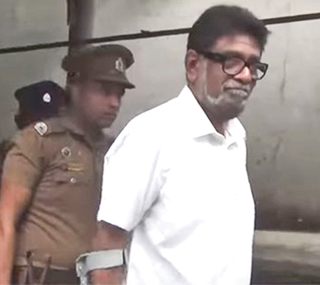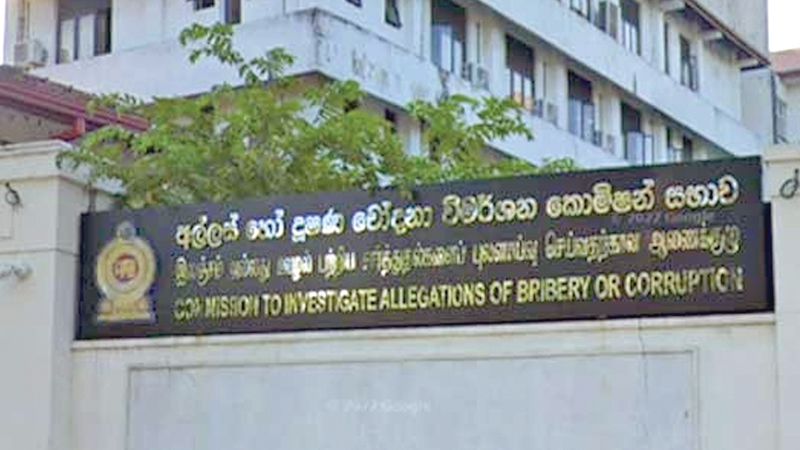 A Government-appointed village officer or popularly known as Grama Niladhari was arrested by the Commission to Investigate Allegations of Bribery or Corruption (CIABOC) this week in the Jaffna district.
A Government-appointed village officer or popularly known as Grama Niladhari was arrested by the Commission to Investigate Allegations of Bribery or Corruption (CIABOC) this week in the Jaffna district.
He was arrested for accepting a 128 GB pen drive to sign a document that an area resident requested approval for, to fell three coconut trees in his land.
In a separate incident, CIABOC also arrested a Police Sergeant at the Kinniya Police station in the East for demanding a bribe of Rs. 10,000 for not implementing the law for not having a valid driving licence.
Both incidents came a week after the CIABOC team raided the Department of Motor Traffic in Narahenpita and arrested three Government officials including a Deputy Commissioner with over Rs. 4.1 million unexplainable cash. Such actions have at least not been seen in public during the past successive Governments, unless the accused is an Opposition politician.
Curbing corruption
Sri Lanka has long grappled with the challenge of curbing corruption within its political and administrative systems. Anti-corruption measures date back to the establishment of institutions such as CIABOC in 1994. These early efforts were catalysed by increasing public frustration over political patronage, misuse of State resources and financial irregularities in public procurement.

Former Health Minister Keheliya Rambukwella
Despite the formation of such bodies, successive Governments failed to deliver substantial results, as investigations often stalled and prosecutions were rare. Over the decades, watchdog organisations and civil society persistently highlighted the systemic nature of corruption, notably in large infrastructure projects, defence procurement and welfare schemes.
The 19th Amendment to the Constitution in 2015 aimed to strengthen independent commissions, including CIABOC, yet enforcement remained weak. The Gotabaya Rajapaksa administration (2019-2022) whose members were under investigations for numerous corruption allegations, particularly during the Covid-19 pandemic did not push for most of those past corruption cases. And the result was an unprecedented economic crisis and eroded public trust.
Several structural and political factors contributed to Sri Lanka’s failure to eliminate corruption. First and foremost, political interference in investigative bodies created an environment where powerful figures enjoyed impunity.
Institutions such as CIABOC, though empowered in theory, lacked prosecutorial independence and were often undermined by bureaucratic delays. Anti-corruption laws have sometimes been enforced selectively, targeting political opponents while protecting loyalists, which undermines trust in the justice system.
Secondly, the lack of a transparent system for political campaign financing and the revolving door between business and politics entrenched vested interests. Whistleblowers lacked legal protections, further discouraging public servants and citizens from exposing misconduct.
Legal loopholes and protracted court procedures made corruption cases difficult to pursue or delayed the cases beyond reasonable time. While laws exist, enforcement is inconsistent. Delays in the legal process, lack of resources for investigations, and a culture of impunity contribute to ineffective implementation. Protracted court procedures and case backlogs mean that many corruption cases take years—sometimes decades—to resolve, which weakens deterrence.
The electorate’s periodic acceptance of patronage politics, where political loyalty was rewarded over merit, also helped to normalise corruption as part of governance. As a result, even high-profile corruption scandals rarely led to convictions, and public cynicism towards anti-corruption rhetoric grew.
Since coming to power in 2024, the Anura Kumara Dissanayake-led National People’s Power (NPP) Government has positioned anti-corruption as a cornerstone of its reform agenda. In fact, many people voted for the NPP only to end deep-rooted and systemic corruption in Sri Lanka.
There have been early signs of change, notably in the perceived autonomy of CIABOC and the initiation of several high-profile investigations and arrests. The increased trend of arrests is due to the autonomy CIABOC enjoys now, though there is a criticism over political interference to speed up the past corruption cases.
The Government has also taken steps to introduce more transparent procurement processes and digitalise administrative services to reduce discretionary power and rent-seeking behaviour. Though this has not been fully implemented, analysts say the move will reduce corruption drastically in future. Some public officials still resist proposed digitalisation moves as most of them have been in a comfortable zone in the past corrupt system.
Oversight mechanisms
Parliamentary oversight mechanisms have been strengthened, and civil society has been encouraged to participate in anti-corruption dialogues. However, critics said that the pace of reforms has been slower than expected and that the true test will be the Government’s willingness to prosecute figures within its own ranks and maintain transparency throughout the process.
During its 2024 Presidential and Parliamentary election campaigns, the NPP ran on a strong anti-corruption platform. NPP leader Dissanayake vowed to establish a “zero-tolerance” policy towards corruption and to prosecute those responsible for past abuses, regardless of political affiliation.
The measures include strengthening CIABOC and insulating it from political pressure, enacting legislation to ensure transparency in public procurement, introducing campaign finance reform (the law was enacted under the last Government), creating legal safeguards for whistleblowers, and establishing a special anti-corruption court to expedite cases.
These pledges resonated with a public weary of systemic corruption and helped propel the NPP to electoral victory. However, there have been concerns over the pace of the implementation of the pledges. The ruling NPP swept to power on a wave of public anger over systemic corruption, promising a sweeping anti-graft campaign that would hold all wrongdoers accountable regardless of status or party.
However, months into their term, public enthusiasm has waned amid growing frustration over delays in major prosecutions and legislative reforms. While a few high-profile arrests have taken place, many citizens feel the promised transformation has stalled, raising concerns that even the NPP – once seen as an untainted alternative – may be faltering in the face of entrenched political resistance and bureaucratic inertia.
However, the recent arrests, analysts say, have been changing that perception.
Since January 2025, CIABOC has arrested several high-profile persons on corruption and misappropriation charges. They include former Health Minister Keheliya Rambukwella, over fraudulent drug procurements, ex-State Minister Prasanna Ranaweera, for illegal land sales, and MP Chamara Sampath Dassanayake, for misappropriating Provincial Council funds in the previous administration.
Some of high profile political leaders are also serving in prison: Former Minister Mervyn Silva, for alleged involvement in a State land scam, Mahindananda Aluthgamage on the fertiliser scam first and later on misappropriation in carom board purchasing, Nalin Fernando on misappropriation in carom board purchasing, former North Western Province Chief Minister S. M. Ranjith on fuel allowance misappropriation and former minister Duminda Dissanayake on suspected illegal weapon usage.
These arrests mark a departure from past practice, where political figures were rarely held accountable.
Can CIABOC sustain the move?
CIABOC appears to be more proactive under the NPP Government. The Commission has increased the frequency of raids and investigations, and high-profile arrests have occurred within months of the Government taking office.
Unlike in the past, when investigations were delayed or quietly shelved, there is a newfound sense of urgency and institutional backing amid public pressure for the Government to deliver.
CIABOC’s leadership has publicly affirmed its independence, and budgetary allocations have been increased to enhance operational capacity.
While it remains early in the NPP’s term, CIABOC’s aggressive posture signals a potential institutional shift towards greater accountability.
The Opposition, particularly members of the Sri Lanka Podujana Peramuna (SLPP) and affiliated parties, has accused the NPP Government of using anti-corruption investigations as a cover for political retribution.
They said that the timing of arrests and the focus on figures from previous regimes indicate selective enforcement. Some Opposition leaders have said that the Government is avoiding scrutiny of alleged misconduct among its allies.
However, public sentiment currently favours the crackdown, and many view the Opposition’s claims as attempts to deflect accountability. Independent observers stress the importance of due process and call upon the NPP Government to ensure that all investigations are evidence-based and transparent to counter allegations of bias.
Delay in action
Despite early momentum, there has been criticism regarding delays in implementing broader systemic reforms. Key legislation on whistleblower protection and anti-corruption courts is still pending in Parliament.
Part of the delay can be attributed to bureaucratic inertia and the complexity of institutional reforms. However, civil society groups said that prolonged delays risk undermining public confidence and giving corrupt networks time to regroup.
The Government has pledged to expedite reforms and has set mid-2025 as the deadline to enact major anti-corruption legislation. It remains to be seen whether this timeline will be met.
The NPP Government has made a strong start by empowering CIABOC and initiating high-profile arrests. These actions align with their campaign promises and have set a precedent for accountability.
Moreover, the administration has been vocal about transparency and has invited civil society participation in oversight processes. However, the Government is yet to deliver on several structural reforms it promised, such as the establishment of a special anti-corruption court and full whistleblower protections.
Sustained political will, cross-party collaboration, and civic engagement will be the key to realising this vision.









